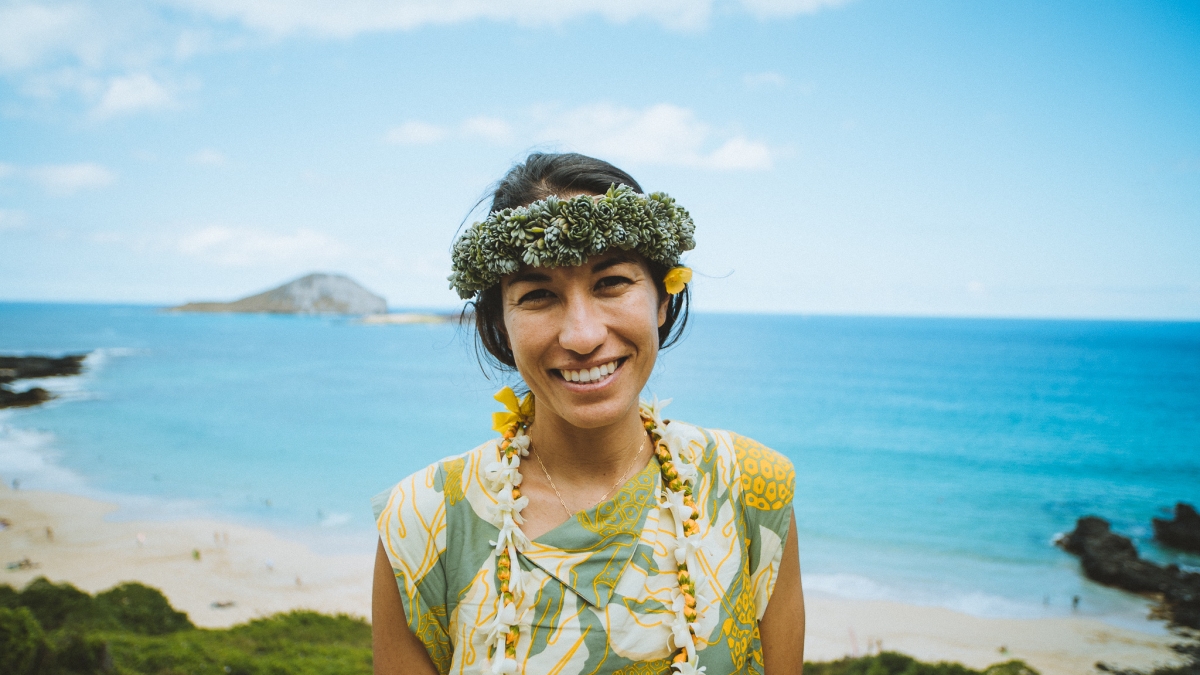ASU professor uses background as Hawaiian voyager, climate scientist to provide inclusive understanding of environment

This year, Haunani Kane will bring her extensive knowledge in climate science to Arizona State University’s School of Geographical Sciences and Urban Planning and Center for Global Discovery and Conservation Science as an assistant professor.
Haunani Kane was raised at the base of Olomana in the coastal community of Kailua, Oahu, Hawaii, where she practiced traditional Hawaiian wayfinding and navigation from a young age. This early interest in and connection to the environment led her to pursue a PhD in earth and planetary sciences at the University of Hawaii.
This year, Kane will bring her extensive knowledge in climate science to Arizona State University’s School of Geographical Sciences and Urban Planning and Center for Global Discovery and Conservation Science (GDCS) as an assistant professor.
“We are thrilled to have Haunani Kane join us in The College,” said Pardis Mahdavi, dean of social sciences in The College of Liberal Arts and Sciences. “As an innovator in her field, a first-rate scholar and an outstanding educator, she is a wonderful addition to our faculty at ASU. I am eager to see what exciting developments she makes in her new role.”
Kane’s research combines coastal geomorphology, paleo-environmental reconstructions, spatial analysis and the perspectives of a native islander to investigate how islands, reefs and island people are impacted by changes in climate. As a National Science Foundation postdoctoral research fellow, she has spent nearly 200 days at sea aboard both traditional sailing and modern research vessels.
“This is a game changer for ASU. Having a stellar scientist who also deeply understands Hawaiian knowledge systems as part of our efforts in Hawaii and in our university allows us to engage in new scientific efforts, prepare our students differently, widen our global footprint and be responsible partners in Hawaii and throughout the Pacific,” said Bryan Brayboy, President’s Professor in the School of Social Transformation, director of the Center for Indian Education and special adviser to the president on American Indian affairs.
In addition, Kane's research and teaching relies upon reestablishing ancestral relationships to place. Through this process, she strives to provide a more inclusive understanding of the impacts of environmental stressors and ensure that the best available climate science data is reflective of all stories of place and their people.
“Growing up in Hawaii, I was taught early on the profound impact that an exceptional teacher and mentor can have on your life,” Kane said. “My teachers taught from their experiences and relationships with place. They used the ocean as a classroom, the sky as a blackboard and traditional deep-sea voyages on double-hulled canoes as our final exam. Most importantly, they taught me to critically think about the world around me through the lens of my ancestors and as a modern scientist. These amazing teachers instilled upon me the responsibility of providing the same learning opportunities and guidance to the next generation.”
She is currently working on a project in Papahānaumokuākea Marine National Monument, a cultural and natural UNESCO World Heritage site located in Hawaii. Building upon a Hawaiian proverb “He pūkoʻa kani ʻāina” that describes how reefs grow into islands, she is looking to identify the biogeological linkages that enable or limit island resilience to storms and sea level rise.
Gregory Asner, director of GDCS, said Kane's ability to combine her intergenerational knowledge with contemporary scientific know-how is just one of the reasons he is thrilled to have her join the faculty at GDCS, based in Hawaii and Arizona.
“Amazingly, her approach also weaves in adventure and discovery as lead navigator for the Polynesian Voyaging Society,” Asner added.
Kane said it is the creative ways that learning is conducted at ASU that drew her to The College.
“The opportunity to reach students using ASU's online platform provides countless opportunities to not only explore the ways in which we teach but to also provide new opportunities for students from all backgrounds across the globe,” she said. “I am excited to join the Center for Global Discovery and Conservation Science. GDCS is a leader in conservation research because of their ability to provide global solutions to marine and terrestrial environments. The opportunity to conduct really impactful research at home in Hawaii has been a goal of mine since graduate school.”
Outside of her academic work, Kane enjoys surfing, sailing and spending time with her family. She is actively involved in traditional voyaging and has visited many islands across the Pacific by canoe. She hopes to develop and teach a course that incorporates voyaging and science.